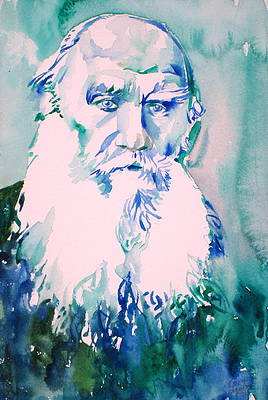Leo Tolstoy Archive
Written: 1899
Source: Original text from Gutenberg.org
Transcription/Markup: Andy Carloff
Online Source: RevoltLib.com; 2021

Through a door, at the back of the room, entered, with a wriggling gait, the thin, yellow Vera Doukhova, with her large, kind eyes.
“Thanks for having come,” she said, pressing Nekhludoff’s hand. “Do you remember me? Let us sit down.”
“I did not expect to see you like this.”
“Oh, I am very happy. It is so delightful, so delightful, that I desire nothing better,” said Vera Doukhova, with the usual expression of fright in the large, kind, round eyes fixed on Nekhludoff, and twisting the terribly thin, sinewy neck, surrounded by the shabby, crumpled, dirty collar of her bodice. Nekhludoff asked her how she came to be in prison.
In answer she began relating all about her affairs with great animation. Her speech was intermingled with a great many long words, such as propaganda, disorganization, social groups, sections and sub-sections, about which she seemed to think everybody knew, but which Nekhludoff had never heard of.
She told him all the secrets of the Nardovolstvo, [literally, “People’s Freedom,” a revolutionary movement] evidently convinced that he was pleased to hear them. Nekhludoff looked at her miserable little neck, her thin, unkempt hair, and wondered why she had been doing all these strange things, and why she was now telling all this to him. He pitied her, but not as he had pitied Menshoff, the peasant, kept for no fault of his own in the stinking prison. She was pitiable because of the confusion that filled her mind. It was clear that she considered herself a heroine, and was ready to give her life for a cause, though she could hardly have explained what that cause was and in what its success would lie.
The business that Vera Doukhova wanted to see Nekhludoff about was the following: A friend of hers, who had not even belonged to their “sub-group,” as she expressed it, had been arrested with her about five months before, and imprisoned in the Petropavlovsky fortress because some prohibited books and papers (which she had been asked to keep) had been found in her possession. Vera Doukhova felt herself in some measure to blame for her friend’s arrest, and implored Nekhludoff, who had connections among influential people, to do all he could in order to set this friend free.
Besides this, Doukhova asked him to try and get permission for another friend of hers, Gourkevitch (who was also imprisoned in the Petropavlovsky fortress), to see his parents, and to procure some scientific books which he required for his studies. Nekhludoff promised to do what he could when he went to Petersburg.
As to her own story, this is what she said: Having finished a course of midwifery, she became connected with a group of adherents to the Nardovolstvo, and made up her mind to agitate in the revolutionary movement. At first all went on smoothly. She wrote proclamations and occupied herself with propaganda work in the factories; then, an important member having been arrested, their papers were seized and all concerned were arrested. “I was also arrested, and shall be exiled. But what does it matter? I feel perfectly happy.” She concluded her story with a piteous smile.
Nekhludoff made some inquiries concerning the girl with the prominent eyes. Vera Doukhova told him that this girl was the daughter of a general, and had been long attached to the revolutionary party, and was arrested because she had pleaded guilty to having shot a gendarme. She lived in a house with some conspirators, where they had a secret printing press. One night, when the police came to search this house, the occupiers resolved to defend themselves, put out the light, and began destroying the things that might incriminate them. The police forced their way in, and one of the conspirators fired, and mortally wounded a gendarme. When an inquiry was instituted, this girl said that it was she who had fired, although she had never had a revolver in her hands, and would not have hurt a fly. And she kept to it, and was now condemned to penal servitude in Siberia.
“An altruistic, fine character,” said Vera Doukhova, approvingly.
The third business that Vera Doukhova wanted to talk about concerned Maslova. She knew, as everybody does know in prison, the story of Maslova’s life and his connection with her, and advised him to take steps to get her removed into the political prisoner’s ward, or into the hospital to help to nurse the sick, of which there were very many at that time, so that extra nurses were needed.
Nekhludoff thanked her for the advice, and said he would try to act upon it.